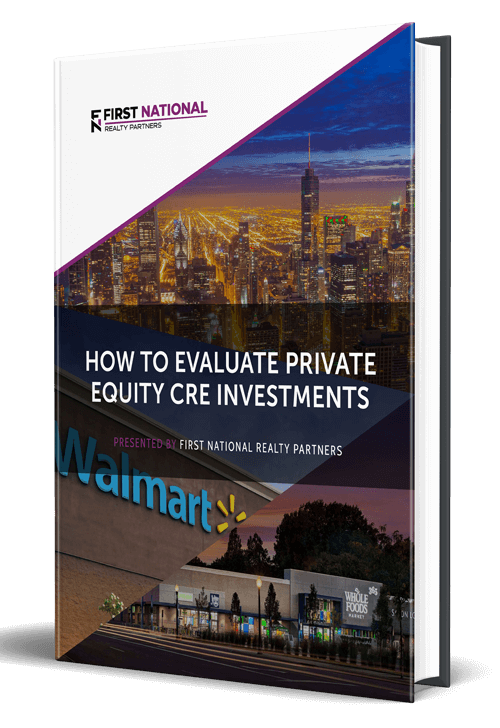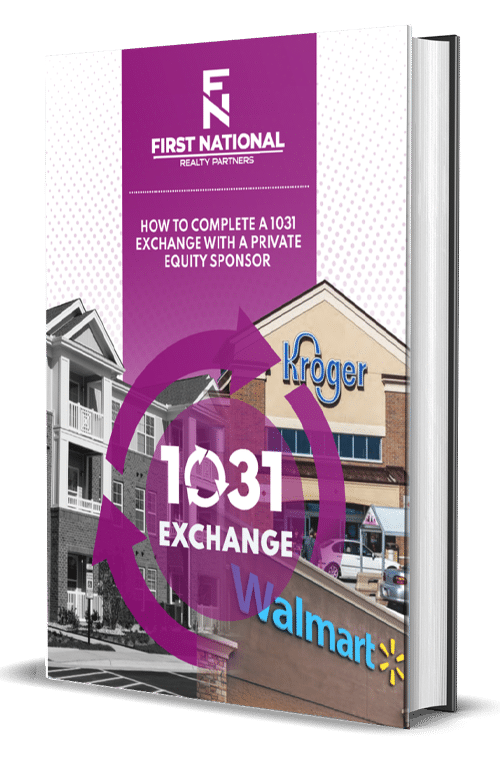When used correctly, a 1031 Exchange can be a powerful tax deferral tool that can allow a real estate investor to grow their capital, tax deferred over time. But, a 1031 Exchange is a complex transaction with a lot of rules that must be followed to achieve full tax deferral. One of those rules has to do with the amount of time that a property is held before it is sold.
In this article, we are going to discuss the 1031 Exchange holding period. We will describe what it is, why it matters in commercial real estate, and the consequences of violating it. By the end, readers will be able to use this knowledge to help plan for a future 1031 Exchange transaction.
First National Realty Partners is a leading private equity firm that specializes in the acquisition and management of grocery store anchored retail centers. As part of our business, we frequently assist investors with the planning for and placement of 1031 Exchange funds. If you are an Accredited Investor and would like to learn more about our 1031 Exchange investment opportunities, click here.
What is a 1031 Exchange?
In order to fully understand the 1031 Exchange holding period, it is first necessary to understand what a 1031 Exchange is.
A 1031 Exchange, named after internal revenue code section 1031, is a real estate transaction that allows investors to defer capital gains taxes on the profitable sale of an investment property (the “relinquished property” as long as they reinvest the sales proceeds into another property of like kind (the “replacement property”).
To complete a 1031 Exchange successfully, real estate investors must abide by a number of rules set forth by the IRS. Among the most important are:
- Within 45 days of the sale date, real estate investors must formally identify the replacement property that they intend to purchase.
- Within 180 days of the sale date, investors must close on the purchase of the replacement property.
- The value of the replacement property must be equal to or greater than the value of the relinquished property.
- Finally, the property must be “held for productive use in a trade or for business or for investment.”
With regard to the holding period, this last requirement is particularly important.
What is a 1031 Exchange Holding Period?
The holding period in a 1031 Exchange is the amount of time that the property must be held to qualify for full tax deferral. IRS rules don’t explicitly state an amount of time, but revenue rulings can provide some hints as to what the holding period needs to be. There are considerations on both the buy side and the sell side.
On the buy side, the IRS has previously issued rulings that a taxpayer may not acquire a real estate property immediately before the planned exchange. In such a scenario, the IRS would view the property as being purchased for resale (at a profit), not as being held for investment purposes.
On the sell side, a taxpayer cannot immediately sell a property after the completion of a 1031 Exchange. Again, if this happened, the IRS would view the property as not being held for “productive use in a trade or for business or for investment.”
In short, IRS guidance states that a taxpayer cannot buy a property immediately before or sell it immediately after a 1031 Exchange.
So, How Long Does a Property Need To Be Held?
Again, there is no specific number of days or years, but it is generally agreed upon that a property should be held for a minimum of 1-2 years before attempting a 1031 Exchange.
The logic behind this guidance is that, if a property is owned for one year, it will show up on two of an investor’s annual tax returns. In addition, Congress has previously proposed guidance that a property should be held for 12 months. It was never codified into law, but has become generally accepted as a guideline.
What is The Purpose of a 1031 Exchange Holding Period?
There is a simple reason why a holding period is necessary in commercial real estate: to prevent the misuse of this very effective tax planning strategy.
Without any holding period guidelines, investors may be incentivized to take speculative risk when buying and selling real estate assets. This is not the behavior that the program is meant to encourage. Instead, it is meant to reward safe, long term investment for small business owners and individual real estate investors.
Issues With Unclear Holding Period Guidelines
The implications of the lack of holding period clarity can be costly. Without explicit guidance, investors may begin a 1031 Exchange in good faith, only to learn that it is disqualified and the gain is taxable.
For this reason, investors should not attempt a 1031 Exchange on their own. As a best practice, they should use a Qualified Intermediary and/or tax advisor, who is an expert in the 1031 Exchange process and all of the rules that govern it (including holding period requirements). They will be able to provide the necessary guidance to help navigate the entire process, while ensuring that the transaction qualifies for full tax deferral.
1031 Exchange Holding Period Examples
To illustrate how the 1031 Exchange holding period works, two examples are provided – a positive one and a negative one.
In the first example, suppose that an individual real estate investor purchased a small retail property for their own account. After holding it for 10 years, they decide that they would like to sell it because they are ready to retire. After a profitable sale, they find a new property (with lower maintenance requirements) and purchase it so they can avoid the long term capital gains taxes on the real property purchased. They plan to hold the property for the income it produces to support their retirement. This is a clear cut example of a 1031 Exchange where there is no question that the property was held for a sufficient amount of time.
Now, assume the same scenario. But, 2 months after the purchase of the new property (and the completion of the 1031 Exchange), they sell the property to another investor. In this situation, the exchange could be disqualified because of the short period of time the new property was held before sale. It could appear that the only point of purchase was to avoid the income tax consequences, not to hold it for investment.
What the 1031 Holding Period Means for Real Estate Investors
For real estate investors, the consequences of not adhering to holding period requirements means that the transaction could become taxable.
Summary of 1031 Exchange Holding Period
A 1031 Exchange is a type of real estate transaction, named after the section in the tax code that allows it, that allows real estate investors to defer capital gains taxes on the profitable sale of a property as long as they reinvest the proceeds into another property that is “like kind” to the one sold. For this reason, it is sometimes referred to as a like kind exchange.
To qualify for full tax deferral, investors must abide by a number of rules. For example, they cannot exchange their primary residence or vacation home, must identify a replacement property within 45 days, and must hold the property for investment purposes.
The time period required to hold a property for “investment purposes” is not explicitly defined in the tax code, but it is generally agreed that a minimum of 1-2 years is required.
The consequences of not meeting this threshold can be costly. If it is determined that the property was not held long enough to demonstrate that it was purchased for “investment purposes” the exchange can be disqualified and the gain could become taxable.
To ensure that all rules are followed, real estate investors should work with a qualified intermediary who can provide the necessary guidance on the required holding period.
Interested In Learning More?
First National Realty Partners is one of the country’s leading private equity commercial real estate investment firms. We leverage our decades of expertise and our available liquidity to find world-class, multi-tenanted assets below intrinsic value. In doing so, we seek to create superior long-term, risk-adjusted returns for our investors while creating strong economic assets for the communities we invest in.
If you are an Accredited Investor and would like to learn more about our investment opportunities, contact us at (800) 605-4966 or info@fnrpusa.com for more information.






